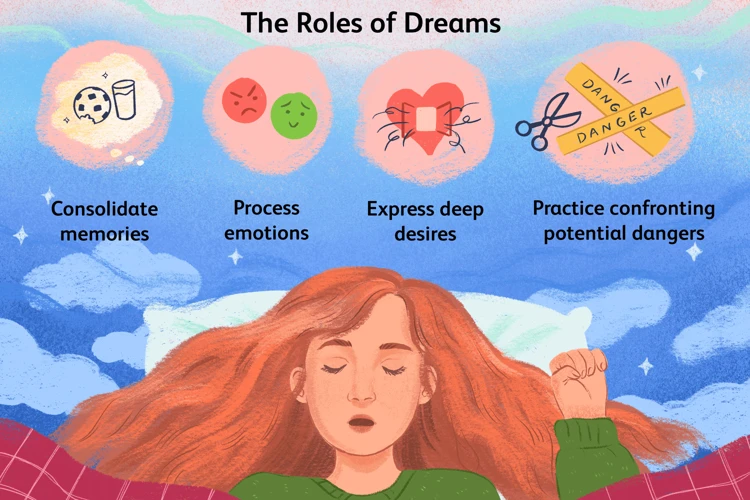Have you ever woken up in a cold sweat, unable to shake the vivid images from a recurring dream that seems to haunt your nights? These enigmatic visions can leave you feeling puzzled about their meaning and significance. With recurring dreams being a common phenomenon experienced by individuals worldwide, it’s essential to unravel the secrets they hold. In this article, we will delve deep into the realm of dreams, analyzing their purpose, uncovering common themes, and exploring how they could reveal hidden aspects of your life. So, grab a cup of tea, get comfortable, and get ready to embark on a journey of self-discovery through the enigmatic world of recurring dreams.
Understanding Recurring Dreams

To truly understand the complexities of recurring dreams, it’s important to dive deeper into their definition and significance. Recurring dreams, as the name suggests, are dreams that reoccur with similar themes, symbols, or narratives. These dreams have a mysterious quality, often leaving us with a lingering sense of curiosity. While the exact reasons behind recurring dreams are still a subject of debate among psychologists, they hold immense value in the realm of self-reflection and personal growth. Recurring dreams can offer valuable insights into our unconscious mind, providing a window into our deepest fears, desires, and unresolved issues. By closely examining the patterns and symbols within these dreams, we can gain a better understanding of ourselves and the complex labyrinth of our psyche. So, let’s embark on a journey of unraveling the enigma of recurring dreams, and unlock the potential for self-discovery and personal transformation.
Definition of Recurring Dreams
At the heart of understanding recurring dreams lies the definition of recurring dreams. These dreams can be characterized as persistent, repetitive experiences that occur over an extended period of time, usually with similar themes, scenarios, or emotions. Unlike ordinary dreams that are fleeting and easily forgotten, recurring dreams grasp our attention by reoccurring frequently and with striking familiarity. They have a distinct quality that sets them apart from regular dreams, leaving us to ponder their deeper meaning. While there isn’t a singular consensus among experts regarding the exact causes of recurring dreams, they are often believed to stem from unresolved psychological conflicts, unresolved trauma, or even repetitive patterns in our everyday lives. Exploring the symbolism embedded within these dreams can be a powerful tool for analysis, offering insight into our unconscious mind and providing an opportunity for self-reflection and personal growth. By delving into the hidden messages they contain, we can begin to unravel the mysteries of our inner world and gain a deeper understanding of ourselves.
The Importance of Recurring Dreams
Recurring dreams hold immense significance in our lives, acting as doorways into our subconscious mind and offering valuable insights into our emotional and psychological well-being. Understanding the importance of recurring dreams can empower us to interpret the messages they convey and unlock hidden aspects of our lives. Here are some key reasons why recurring dreams should not be overlooked:
1. Self-Reflection and Personal Growth: Recurring dreams provide a unique opportunity for self-reflection, allowing us to explore the depths of our emotions, fears, and desires. By analyzing the themes and symbols in these dreams, we can gain a better understanding of ourselves and identify areas for personal growth.
2. Warning Signs and Premonitions: In some cases, recurring dreams can serve as warning signs or premonitions about future events. While not all recurring dreams are prophetic, some individuals have reported experiencing déjà vu or a sense of familiarity when their dreams align with real-life events. These dreams can offer insights, urging us to pay attention to certain aspects of our lives.
3. Unresolved Issues and Trauma: Recurring dreams often highlight unresolved issues and unhealed emotional scars. They provide a safe space for the mind to process and confront past traumas. By paying attention to recurring dream themes, we can identify areas where we need healing and seek appropriate support.
4. Symbolic Communication: Dreams often communicate in symbolic language. Through recurring dreams, our subconscious mind uses symbols and metaphors to express emotions, conflicts, and experiences that may be difficult to grasp consciously. Diving deeper into these symbols can bring clarity and insight.
5. Enhancing Creativity and Problem-Solving: Recurring dreams have been known to ignite creativity and enhance problem-solving abilities. They can inspire new ideas, perspectives, and solutions to lingering challenges or dilemmas in our waking lives.
By acknowledging the importance of recurring dreams, we can honor the messages they carry and utilize them as valuable tools for self-discovery, growth, and navigating our journey through life. So, let’s embrace the mysteries of recurring dreams and unlock the profound wisdom they hold within. (For more information on dreams as premonitions, read our article on the link between dreams and future events.)
Common Themes in Recurring Dreams

When it comes to recurring dreams, certain themes tend to emerge across various individuals. One of the most prevalent themes is the sensation of falling. This dream often evokes a sense of fear or loss of control, leaving us wondering about its deeper meaning. Another common recurring dream involves being chased, where an unknown entity or figure relentlessly pursues us, sparking feelings of anxiety and vulnerability. Additionally, many individuals experience the disturbing sensation of their teeth falling out in their dreams, which can be linked to issues of self-esteem and communication. Although these themes may differ from person to person, they share a common thread of evoking powerful emotions and leaving a lasting impression long after we wake up. Analyzing these recurring dream themes can provide valuable insights into our subconscious fears, desires, and unresolved issues, guiding us on a journey of self-discovery and introspection.
Falling
is a common theme in recurring dreams that can evoke a wide range of emotions. When you experience dreams of falling, it often creates a sense of fear, anxiety, or helplessness. These dreams typically involve a sensation of losing control and plummeting from a great height. The emotions associated with falling dreams are often symbolic of real-life situations where you feel overwhelmed or out of control. The symbolism of falling can represent a fear of failure, an inability to keep up with the demands of life, or a sense of being overwhelmed by a particular circumstance. Falling dreams may also indicate a lack of stability or a fear of losing grip on a certain aspect of your life. It’s important to pay attention to the context and emotions surrounding these dreams to gain a better understanding of their meaning for you personally. By analyzing the recurring nature of falling dreams and exploring your emotional response to them, you can gain valuable insights into areas of your life that may need attention or resolution.
Being Chased
Being chased is a common theme in recurring dreams that can evoke feelings of fear, anxiety, and vulnerability. This dream scenario often involves a relentless pursuer chasing the dreamer, causing a sense of panic and the frantic need to escape. The feeling of being chased can symbolize various aspects of our waking lives and highlight underlying psychological or emotional challenges. Here are some possible interpretations of recurring dreams about being chased:
1. Feelings of Avoidance: Being chased in a dream may reflect an avoidance behavior in waking life. It could indicate unresolved conflicts, difficult emotions, or challenging situations that we are actively trying to avoid confronting. The dream may be urging us to confront these issues head-on and face our fears.
2. Pressure or Expectations: Dreams of being chased could also signify the pressure and expectations we feel from others or ourselves. It may suggest that we are constantly striving to meet certain goals, fulfill obligations, or live up to societal expectations. This type of dream serves as a reminder to examine the sources of pressure in our lives and evaluate whether they align with our true desires and values.
3. Anxiety and Stress: The sensation of being chased can be linked to underlying anxiety or stress in our waking lives. It could indicate a sense of being overwhelmed or constantly under threat. These dreams might be a signal to prioritize self-care, implement stress-management techniques, and seek support to alleviate feelings of anxiety.
4. Avoiding Personal Growth: Being chased in a recurring dream may signify a resistance to personal growth or the fear of stepping out of our comfort zones. It could suggest that we are avoiding taking risks or pursuing opportunities that could lead to self-improvement and fulfillment. This dream theme encourages us to embrace change, face challenges, and embrace the transformative journey that life offers.
It’s important to note that these interpretations are subjective, and the meaning of being chased in dreams may vary for each individual. To gain a deeper understanding of the specific symbolism and personal context surrounding your recurring dreams, it can be helpful to keep a dream journal, consult dream experts, or engage in self-reflection to identify any patterns or underlying emotions associated with being chased in your dreams.
Teeth Falling Out
One of the most common themes in recurring dreams is the experience of teeth falling out. This bizarre and unsettling dream scenario often leaves many wondering about its hidden meaning. While it may seem alarming, dream analysts interpret this dream as a symbolic representation of powerlessness or a loss of control in one’s life. From a psychological standpoint, teeth are associated with our ability to communicate effectively, present ourselves confidently, and maintain our self-image. Thus, the dream of teeth falling out could indicate a fear of losing these fundamental aspects of our identity. It may also reflect underlying anxiety about our appearance, fear of aging, or concerns about our ability to express ourselves. Additionally, this dream theme can signify a sense of vulnerability or powerlessness in a particular area of our waking life. By paying attention to the intricate details and emotions surrounding this dream, we can gain valuable insights into areas where we may need to regain a sense of control or address underlying anxieties. So, next time you find yourself in the unsettling dream of teeth falling out, take a moment to reflect on its symbolism and consider how it may relate to your waking experiences.
Interpreting Recurring Dreams

Interpreting recurring dreams can be a fascinating and enlightening process. When it comes to decoding the messages hidden within these dreams, it’s crucial to adopt a thoughtful and analytical approach. One strategy for interpretation is to start by identifying patterns and symbols that frequently appear in your dreams. These recurring elements often hold deep personal significance and can provide insight into your subconscious mind. Another important consideration is to analyze the context of your dreams within your own life. Are there any current events or unresolved emotions that could be influencing your dream landscape? By reflecting on your personal circumstances, you can better understand the underlying meanings of your recurring dreams. If you find yourself struggling to decipher the symbolism or if your recurring dreams persistently trouble you, seeking guidance from dream experts or therapists can offer additional perspectives and help shed light on the hidden messages the dreams may hold. So, grab a dream journal and let’s embark on a quest of interpretation, as we unlock the enigmatic world of recurring dreams.
Identify Patterns and Symbols
Identifying patterns and symbols is a crucial step in interpreting recurring dreams. These dreams often feature recurring elements, such as specific objects, settings, or actions that hold symbolic meaning. By paying close attention to these patterns, we can gain insights into the underlying messages of our dreams. Start by keeping a dream journal where you record and analyze your dreams, noting any recurring themes or symbols that emerge. Look for connections between these elements and your waking life. For example, a recurring symbol of water could represent emotions or a need for emotional cleansing. As you gather more dreams, you may start to notice recurring patterns that can help you piece together the puzzle of your subconscious mind. It’s important to approach these patterns and symbols with an open mind, allowing yourself to explore different interpretations and uncover the personal meaning they hold for you. Remember, the symbolism in dreams is highly subjective, so trust your intuition and personal associations when deciphering their significance.
Consider Personal Context
When interpreting recurring dreams, it’s crucial to consider your personal context. Dreams are deeply personal experiences, and their meanings can vary greatly from person to person. To fully understand the significance of your recurring dreams, reflect on your current life circumstances, emotions, and relationships. Pay attention to any recent changes or events that might be influencing your dream content. For example, if you’ve recently started a new job and find yourself having recurring dreams about being unprepared or overwhelmed, it could be a reflection of your anxieties and uncertainties in your waking life. Additionally, delve into your past experiences and traumas that may have shaped your subconscious mind. These events can often resurface in recurring dreams as a way of processing unresolved emotions or traumas. By analyzing your personal context, you can gain valuable insights into the specific meanings and messages embedded within your recurring dreams. So, take a moment to reflect on your life and the unique factors that shape your dream experiences, and uncover the hidden truths that lie within.
Consulting Dream Experts
can provide valuable guidance and insights into the meaning behind your recurring dreams. Dream experts, also known as dream psychologists or dream therapists, are professionals who specialize in the interpretation and analysis of dreams. They have a deep understanding of the symbolism and hidden messages that dreams convey and can help you navigate the complex landscape of your recurring dreams. These experts possess knowledge about various theories and frameworks of dream analysis, allowing them to provide you with different perspectives on the meaning behind your dreams. They can help you identify recurring patterns, symbols, and themes in your dreams and offer interpretations based on their expertise. Consulting a dream expert can be particularly beneficial if you are struggling to interpret your dreams on your own or if you feel overwhelmed by the emotions evoked by your recurring dreams. They can provide you with a safe and supportive space to explore your dreams, helping you gain valuable insights into your innermost thoughts and emotions. Whether you choose to consult a dream expert in person, online, or through books and resources written by dream professionals, their expertise can play a significant role in unraveling the mysteries of your recurring dreams.
What Your Recurring Dreams Could Reveal

Recurring dreams have the potential to act as gateways to our subconscious, unveiling hidden aspects of our lives that we may not be fully aware of. These dreams can reveal a range of insights, including unresolved issues or deep-rooted trauma that require attention and healing. Unresolved issues or trauma can manifest in recurring dreams as symbolic representations, allowing us to confront and process these emotions in the safety of our unconscious mind. Recurring dreams can also shed light on our unconscious desires or fears, unraveling our deepest longings or anxieties that may be influencing our waking life. These dreams may expose repetitive patterns in our lives that we may have been oblivious to, enabling us to make positive changes and break free from detrimental cycles. So, pay attention to the messages that your recurring dreams are trying to convey, as they hold the keys to a greater understanding of yourself and your life’s journey.
Unresolved Issues or Trauma
Unresolved issues or trauma can play a significant role in recurring dreams. These dreams often act as a channel for our subconscious mind to process and confront past experiences or unaddressed emotions. When we encounter unresolved issues or trauma in our waking life, they can leave a lasting impact on our psyche, influencing our dreamscape. Recurring dreams related to unresolved issues or trauma may feature familiar situations, people, or symbols that remind us of the original event or emotion. These dreams serve as a call for healing and resolution, urging us to confront and work through these unresolved aspects of our lives. By paying attention to the details and emotions within these dreams, we can gain insights into the areas of our lives that require attention and healing. It’s important to approach these dreams with compassion and seek professional help if needed to navigate the process of healing from past traumas. Remember, dreams are not just figments of our imagination but can be powerful tools for personal growth and self-discovery.
Unconscious Desires or Fears
Unconscious desires or fears play a significant role in recurring dreams. These dreams often serve as a conduit for our deepest and most concealed emotions, revealing aspects of our psyche that may be hidden from our waking selves. Unconscious desires can manifest in recurring dreams through symbolic representations, manifesting as unfulfilled wishes or longings. For example, one may consistently dream of being in a luxurious mansion, indicating a deep desire for wealth and success. Similarly, unconscious fears can surface in recurring dreams as terrifying scenarios or recurring nightmares. These dreams may be triggered by unresolved trauma or deeply ingrained fears that we may not be consciously aware of. By paying attention to the emotions and symbols present in these dreams, we can begin to uncover and address these unconscious desires or fears. This can lead to a greater understanding of ourselves and provide an opportunity for personal growth and healing. So, the next time you find yourself experiencing a recurring dream, take a moment to explore the underlying desires or fears that may be influencing its manifestation.
Repetitive Patterns in Your Life
Repetitive Patterns in Your Life can often be reflected in your recurring dreams. These dreams may act as a mirror, highlighting certain behaviors, situations, or choices that you consistently encounter in your waking life. By paying attention to the patterns that emerge within your recurring dreams, you may gain valuable insights into the repetitive cycles that exist in your life. These patterns could relate to your relationships, career, personal habits, or even your emotional well-being. For example, if you frequently have recurring dreams of being stuck in a dead-end job or feeling trapped in a toxic relationship, it could signify that you are experiencing a recurring pattern of feeling stuck or limited in your waking life. On the other hand, recurring dreams depicting positive patterns, such as achieving success or finding love, might indicate your yearning for growth and fulfillment. Recognizing these patterns can empower you to make conscious choices and break free from negative cycles, ultimately leading to personal growth and a more fulfilling life.
Tips for Dealing with Recurring Dreams
When it comes to dealing with recurring dreams, there are several strategies you can employ to gain control and find peace. One effective tip is to keep a dream journal, where you can record the details of your dreams as soon as you wake up. This practice can help you identify patterns and symbols that may be meaningful. Additionally, exploring lucid dreaming techniques can empower you to become aware within the dream and consciously influence its outcome. Techniques such as reality checks and visualization exercises can enhance your ability to recognize when you are dreaming and take charge of the dream’s direction. If recurring dreams continue to cause distress or interfere with your daily life, it may be beneficial to seek professional help from a therapist or dream expert who can offer guidance and support. By implementing these tips, you can take proactive steps towards understanding and resolving the mysteries of your recurring dreams.
Keep a Dream Journal
Keeping a dream journal is a powerful tool in unraveling the mysteries of recurring dreams. By documenting your dreams on a regular basis, you can gain valuable insights into patterns, symbols, and emotions that arise during your dream state. Here are some key reasons why keeping a dream journal is beneficial:
- Improved dream recall: Writing down your dreams immediately upon waking helps train your brain to remember them more vividly. As you develop the habit of journaling, the details of your dreams will become clearer, allowing for a deeper understanding of recurring themes.
- Identifying patterns: By reviewing your dream entries over time, you can identify common symbols or scenarios that frequently occur in your dreams. These patterns may hold significant meaning and provide clues to unresolved issues or hidden desires.
- Emotional exploration: Dreams often evoke strong emotions, and by recording these feelings in your journal, you can gain a better understanding of the underlying emotions that may be influencing your waking life.
To effectively keep a dream journal, follow these tips:
- Keep a journal by your bedside: Place a notebook and pen or a voice recorder next to your bed to record your dreams as soon as you wake up. This immediate capture ensures you don’t forget important details.
- Write in present tense: When recounting your dreams, write in the present tense to capture the immediacy of the dream experience.
- Include details: Be as detailed as possible when describing your dreams. Include people, places, objects, colors, and any actions or events that unfold in the dream.
- Explore your emotions: Reflect on the emotions you experienced in your dream and describe them in your journal. This can provide valuable insights into your emotional state and subconscious desires.
- Regularly review and analyze: Set aside time to review your dream journal and look for recurring themes or symbols. Consider how these themes may relate to your waking life and any personal growth opportunities they may present.
By consistently keeping a dream journal and actively engaging with your dreams, you can unlock the hidden meanings behind your recurring dreams and embark on a journey of self-discovery and personal transformation.
Explore Lucid Dreaming Techniques
Exploring lucid dreaming techniques can offer a fascinating avenue for dealing with recurring dreams. Lucid dreaming is the practice of being aware that you are dreaming while you are still in the dream state. This phenomenon allows you to have some level of control over the dream narrative and can be a powerful tool for resolving recurring dreams. There are several techniques you can try to enhance your lucid dreaming abilities. One popular method is reality testing, where you regularly question your waking reality throughout the day, making it a habit. This habit can carry over into your dreams, prompting you to question whether you are dreaming or not. Another technique is keeping a dream journal. By recording your dreams upon waking, you develop a better sense of dream patterns and symbols, which can help trigger lucidity in future dreams. Additionally, practicing meditation and visualization techniques before bed can increase your chances of having lucid dreams. Visualize yourself becoming aware within a dream and envision the actions you would like to take. This preparation can set the stage for lucidity during sleep. Remember, exploring lucid dreaming techniques requires patience and practice, but the rewards of gaining control over your recurring dreams are worth the effort. So, embrace the realm of lucid dreaming, where you can transform your recurring dreams into powerful and empowering experiences.
Seek Professional Help if Needed
If you find that your recurring dreams are causing significant distress or interfering with your daily life, it may be beneficial to seek professional help from a qualified therapist or psychologist. Professional help can provide you with the guidance and expertise needed to explore the deeper meaning behind your recurring dreams and assist you in unraveling any unresolved issues that may be contributing to them. A trained professional can offer valuable insights and perspectives, helping you navigate through the complex emotions and symbols present in your dreams. Through therapy sessions, you can gain a better understanding of the underlying psychological factors that may be influencing your recurring dreams, such as trauma, anxiety, or unresolved conflicts. Additionally, a therapist can provide you with tools and techniques to cope with and manage any distressing emotions that arise from these dreams. They are equipped to interpret and analyze the symbolism within your dreams, aiding you in uncovering hidden meanings and facilitating personal growth. Remember, seeking professional help is not a sign of weakness but a courageous step towards self-awareness and healing.
Conclusion
In conclusion, recurring dreams can provide valuable insights into our inner world and offer a unique lens for self-exploration. By analyzing the common themes and symbols present in these dreams, we can gain a deeper understanding of our unresolved issues, fears, desires, and repetitive patterns in life. It is important to remember that interpreting dreams is a highly individual and subjective process. While there are general interpretations for certain symbols, it is crucial to consider one’s personal context, emotions, and experiences when deciphering the meaning behind recurring dreams. Keeping a dream journal can be a helpful tool in recording and analyzing these dreams, allowing us to identify patterns and make connections over time. Additionally, exploring lucid dreaming techniques may provide opportunities to gain control over recurring dreams and actively engage with their content. Seeking the guidance of a dream expert or therapist can also provide valuable insights and support in understanding the deeper messages within our dreams. Ultimately, by delving into the world of recurring dreams and paying attention to their messages, we can gain a greater understanding of ourselves and embark on a journey of personal growth and self-discovery. So, embrace the enigma of your dreams, and let them guide you towards a deeper understanding of your life and psyche.
Frequently Asked Questions
What are recurring dreams?
Recurring dreams are dreams that occur repeatedly, featuring similar themes, symbols, or narratives. They have a mysterious quality and can leave us with a sense of intrigue and curiosity.
Why do we have recurring dreams?
The exact reasons behind recurring dreams are still a subject of debate among psychologists. However, they are believed to stem from unresolved issues, unconscious desires, fears, or repetitive patterns in our waking lives.
Are recurring dreams significant?
Yes, recurring dreams hold significant meaning. They provide insights into our subconscious mind and can reveal hidden aspects of our lives, including unresolved trauma, unconscious desires, or repetitive patterns that affect our well-being.
Can recurring dreams be interpreted?
Yes, recurring dreams can be interpreted. By identifying patterns, symbols, and personal context, we can gain a better understanding of the messages and meanings behind these dreams.
What are some common themes in recurring dreams?
Common themes in recurring dreams include falling, being chased, teeth falling out, flying, being late, or being unprepared for an important event.
Should I be worried if I have recurring dreams?
Recurring dreams themselves are not a cause for alarm. However, if they cause significant distress or interfere with your daily life, it may be beneficial to seek professional help.
Can recurring dreams reveal unresolved issues?
Yes, recurring dreams can be a reflection of unresolved issues or trauma in our lives. They may indicate the need to address and work through these issues in order to find resolution and healing.
Can recurring dreams indicate hidden desires or fears?
Absolutely. Recurring dreams often tap into our unconscious mind and can provide insights into our hidden desires, fears, or unacknowledged aspects of ourselves.
Is it helpful to keep a dream journal for recurring dreams?
Yes, keeping a dream journal can be highly beneficial when dealing with recurring dreams. It helps in identifying patterns, symbols, and emotions associated with these dreams, allowing for deeper analysis and interpretation.
Can lucid dreaming techniques help with recurring dreams?
Lucid dreaming techniques, such as reality checks and dream control exercises, can help in managing and potentially altering the content of recurring dreams. This can empower individuals to navigate these dreams with greater awareness and control.








